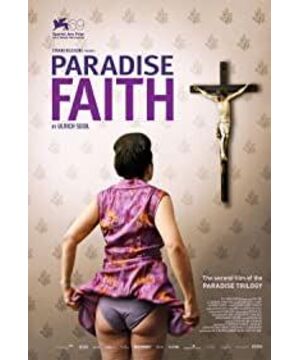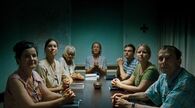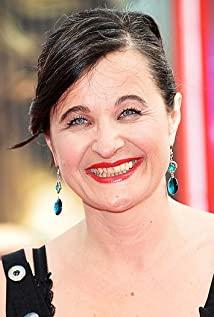Following the last "Paradise: Love", the Austrian director's "Paradise: Faith" still adheres to his philosophy. As the second part of the trilogy structure, the heroine Ana-Maria is the sister of Teresa, the protagonist of the previous film. As an ardent Catholic, she blocks almost all secular life, has no intention to take care of her paraplegic husband, has no friends other than church members, refuses alcohol and entertainment, and thinks everything on TV is full of filth... Anna Maria's Life is to walk around the various residential areas with the statue of the Virgin after work, knocking on the door tirelessly from house to house, and saying to people, "The Wandering Virgin has come to visit you." She asked the latter to provide a space for the statue to enshrine and lead people to pray together. This obsessive, almost fanatical approach has drawn mixed reactions, with some turning it away, some coping with it out of politeness, and some earnestly arguing with it. Anna encounters an atheistic middle class, an immigrant with no status, a poor alcoholic, and a bottom-up frustrated person. In Anna's heart, every time a mission is rejected, it symbolizes the fall of the world and God's test of herself.
At the same time, her husband, who should be most helpful and caring, is rejected by her at home. The disabled man could not accept his wife's eccentric behavior, let alone his indifference. Anna must perform religious rituals every day at home, such as singing hymns emotionally while playing the keyboard, or kneeling in front of the icon, stripping naked and beating herself with a leather whip.
Unlike the gimmicks rendered by the media, this film is actually restrained and calm compared to the direct depiction of sex in the previous "Paradise: Love". The horizontal and vertical still shots in the film make the whole film full of solemn and deadly atmosphere. Director Ulrich Seidel often points the camera at the deep, uninhabited hallways and at Anna's own house as neat as an uninhabited house. These cool-toned images and still compositions perfectly mirror the paranoid heart of an aficionado.
Ulrich Seidl himself is known in the film industry for the lengthy preparation times before each film shoot, and this one is no exception. Before filming, the director led the team to interview believers and churches one by one, holding the Virgin like a family, to discuss with them their views on faith, just like the fanatic Anna in the film did. This directly affects the heroine's shaping of the characters, and also lays a good foundation for the true temperament of the film.
In fact, in addition to the description of the heroine's paranoid preaching in the film, some details also reveal the director's more complicated intentions. Anna's husband is set to be a Muslim who does not reject secular life, while Anna herself works in a hospital. When she works, she has to manipulate the precise instruments that symbolize the spirit of science to diagnose and treat patients. Both of these settings seem to be at odds with her beliefs. The film does not directly describe the conflict between them, but the sharp contradictions that are caused but not triggered behind it are even more profound. In this heavy film, there are always interesting details interspersed, but behind the laughter are all ignorance and helplessness. In the end, a physical conflict broke out between the two because the husband could not bear the status quo. Anna couldn't understand why she was so devout and suffered such torture. She began to beat herself with the whip to the icon...
Some people say that "Heaven: Faith" confronts the control of religion on people, but in fact, the director wants to convey is far from simple. Religious themes in Western movies are commonplace, many of which are not intended to prove the existence of gods, but more to stimulate people’s independent thinking through the debates of the characters and the evolution of the story, thinking about the relationship between gods and the secular, and about beliefs. The boundaries of superstition and the power of human free will. That's the real value of this type of film.
View more about Paradise: Faith reviews








